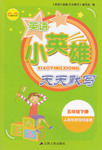题目内容
B. of which
C. to which
D. with that

 英语小英雄天天默写系列答案
英语小英雄天天默写系列答案 暑假作业安徽少年儿童出版社系列答案
暑假作业安徽少年儿童出版社系列答案Each of us fails from time to time.If we are wise, we accept these failures as a 1 part of the learning process.But all too often as parents and teachers we disallow this 2 right to our children.
When I see a child 3 to this kind of pressure, I think of Donnie.
Donnie was my youngest third grader.His 4 of failure kept him from classroom games that other children enjoyed.He 5 answered questions — he might be wrong.
I tried my best to build his 6.But nothing changed until midterm, when Mary Anne, a student teacher, was assigned (安排)to our classroom.
She was young and pretty, and she loved children.My pupils, Donnie included,7 her.
One morning, we were working math problems at the chalkboard.Donnie had 8 the problems with painstaking neatness.Pleased with his progress, I 9 the children with Mary Anne and went for art materials.When I returned, Donnie was in 10 .He’d missed the third problem.
My student teacher looked at me in despair.Suddenly her face 11.From the desk we shared, she got a container filled with pencils.
"Look, Donnie," she said, kneeling beside him and gently 12 the tear stained face from his arms."I’ve got something to13 you." She removed the pencils, one at a time, and placed them on his desk.
"See these 14 , Donnie," she continued."They belong to Mrs. Lindstrom and me.See how the erasers are 15 ? That’s because we make mistakes too.But we erase the mistakes and try again.That’s what you 16 learn to do, too."
She kissed him and stood up."Here," she said, "I’ll leave one of these pencils on 17 desk so you’ll remember that everybody makes mistakes, 18 teachers." Donnie looked up with love in his eyes and a smile.
The pencil became Donnie’s 19 possession.That, together with Mary Anne’s frequent encouragement, gradually 20 him that it’s all right to make mistakes — as long as you erase them and try again.
|
2.A.correct B.same C.important D.natural
3.A.suffering B.object C.fall D.subject
4.A.fear B.lesson C.chance D.sense
5.A.always B.often C.never D.seldom
6.A.self-protection B.self-improvement C.self-confidence D.self-learning
7.A.respected B.disliked C.avoided D.mined
8.A.worked out B.copied C.gone over D.leaned
9.A.left B.offered C.missed D.parted
10.A.surprise B.astonishment C.anger D.tears
11.A.darkened B.brightened C.pulled D.loosened
12.A.lifting B.picking C.holding D.pushing
13.A.help B.show C.reward D.promise
14.A.pencils B.mistakes C.marks D.containers
15.A.used B.built C.worn D.damaged
16.A.may B.must C.will D.can
17.A.my B.someone’s C.the teacher’s D.your
18.A.still B.also C.even D.not
19.A.prized B.own C.kept D.expected
20.A.warned B.informed C.persuaded D.reminded
Justin’s bedroom was so full of flat bicycle tires, bent tennis rackets, deflated(瘪掉的)basketballs, and games with missing pieces that you could barely get in the door. His parents pleaded with him to clean out his room.
“What use is a fish tank with a hole in the bottom?” his father asked. But Justin simply smiled and repeated his motto, “Never throw anything out, you never know when it might come in handy.”
When Justin was away from home, he always carried his blue backpack--a smaller version of his bedroom--a place to store the many objects that he collected. It was so worn and stretched that it hardly resembled a backpack anymore.
Justin had earned a reputation for figuring things out and getting people out of otherwise hopeless situations. Many of his classmates and neighbors sought him out when they needed help with a problem. On the first day of school, his friend Kenny, came looking for Justin.
“Do you think you have something in your bag that could help me remember my locker combination?” he asked. “I lost the piece of paper it was written on. I have a science class in two minutes and if I’m late on the first day it’ll make me look bad for the rest of the year.” Kenny looked really worried.
“Relax,” Justin said, taking his backpack off and unzipping the top. “Remember how you borrowed my notebook in homeroom to write the combination down? Well, I know how we can recover what you wrote.”
He took the notebook and a soft lead pencil out of his bag. The page that Kenny had written on had left faint marks on another page in the notebook. Justin held the pencil on its side and rubbed it lightly over the marks. Slowly but surely the numbers of the locker combination appeared in white, set off by the gray pencil rubbings.
“That’s amazing!” Kenny said. “I owe you one.” And he dashed off to open his locker.
It was just another day in the life of the boy whose motto was “Never throw anything out, you never know when it might come in handy.”
1.Why is Justin’s room such a mess? WWW.K**S*858$$U.COM
|
A.He always forgets to clean it. |
B.He shares the room with his brother. |
|
C.He has no time to clean it. |
D.He never throws anything away. |
2.In what way is Justin’s backpack a smaller version of his bedroom?
|
A.He uses it as a place to store objects. |
|
B.He uses it to carry his books and sports equipment. |
|
C.His parents tell him to clean it all the time. |
|
D.He’s had it for as long as he can remember. |
3.The underlined phrase "pleaded with" means
|
A.ignored |
B.asked |
C.pushed |
D.Ordered |
4.How does Kenny feel toward Justin?
|
A.Annoyed. |
B.Disinterested. |
C.Grateful. |
D.Angry. |